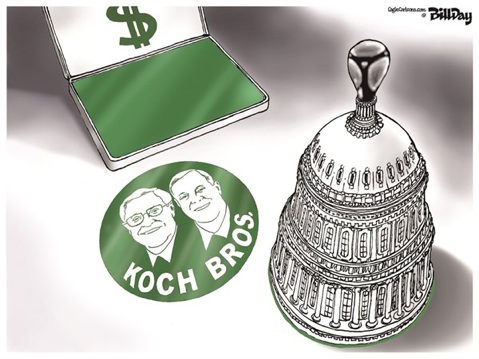Next Stop, Shadowlands U.S.A.
The Koch Brothers and the Buying of American Politics

American politics has throughout its history been shaped by families who have risen in stature and power by serving in the White House and Congress. From the Adamses to the Roosevelts to, in modern times, the Kennedys and the Bushes, these families have left an indelible mark. With 2016 less than a year away, Hillary Clinton may continue her family’s legacy by running for the office of president for a second time.
But in the last half century, there may not be one family that has made more impact on the political landscape of this country as the Koch family — and this despite none holding office in the executive or legislative branch of government. The Koch brothers, specifically Charles and David, have used their vast fortune, their influence, and their ideological drive to mold the conservative movement in the United States in ways that William Buckley and Ronald Reagan fell far short of. Led by Charles Koch, a willing son to his father, Fred Koch, and his fervent free market and anti-communist, anti-collectivist zealotry, conservatism has become a force that has made the Republican Party make a sharp right turn in its vision for America, with no course correction in sight.
In Daniel Schulman’s 2014 book Sons of Wichita, the powerful Koch family’s shadowland comes into focus, an operation propelled by the desire to earn money on the backs of the people they employed, with little regard for the environment, and with contempt for politicians, whom they felt were pawns “that needed a script” to advance the Koch’s corporate agenda
Patriarch Fred Koch found the benevolence of government policy and the bureaucracy that went with it to be counterintuitive to free-market capitalism and America’s 19th-century philosophy of self-rugged individualism, and taught that well to his sons Charles and David. To understand what makes Charles and David Koch “tick,” Schulman gives extraordinary examples.
As the brothers grew up, “Pugilism was an enduring theme,” Schulman recounts. In the business ring, Fred Koch “spent the better part of his professional life warring against the dark forces of communism and the collective might of the nation’s major oil companies, which tried to run him out of business.” When his sons [Frederick, Charles, David, and Bill] waged brutal legal campaigns against one another, wrote Schulman, it would make “Dallas and Dynasty look like a playpen.”
About their activities, Schulman describes how the Justice Department “had documented over 300 spills of oil” in the 1990s, as a result of Koch Industries’ patent lack of safety precautions. “The worst 100,000 gallon spill painted a 12-mile oil slick on Nueces and Corpus Christi bays.” He writes that Charles considered President Obama a “dedicated egalitarian” and the most radical president we have ever seen, “a hardcore economic socialist with politics of his Kenyan father.”
Bill and David were twins, and Bill spent years in litigation with Charles over his passion to involve Koch Industries in politics and expensive lawsuits for failing to follow government regulation. David and Charles first became involved with the John Birch Society, supporting nonprofit foundations that worked to elect ultra-conservatives in city, state, and federal races. The Koch brothers built a reputation as power brokers that reached a crescendo after Obama was elected in 2008.
Today, though Charles and David Koch have reached the twilight of their lives — David has battled cancer, which caused him to be a tremendous benefactor for research to curing his disease — their role in politics is not muted. They called the election of 2012 to unseat Barack Obama the “mother of all wars” and have announced they are willing to spend as much as $1 billion to see a Republican back in the White House in 2017. Thus, with the Supreme Court decision of 2010, Citizens United, the floodgates of their money and others have twisted our election process into a pretzel of inequality. Elections now hold a nightmarish quality that our founding fathers would find reprehensible.
Still, in the shadows of a land that appears dominated by avaricious men with consciences twisted by money, who seem to value human life and our environment no more than a paper cup — used once, easily thrown away — we can remember men like Martin Luther King Jr. The civil rights leader was rich with the currency of compassion and reminded of the phrase that gives all hope: “The arc of the universe bends toward justice.”



